Key takeaways:
- Organic wine production emphasizes natural methods, avoiding synthetic pesticides, fertilizers, and GMOs, resulting in wines that reflect their unique terroirs.
- Health benefits of organic wine include lower sulfites and additives, making them easier on the body and enhancing the overall enjoyment.
- Choosing organic wine involves looking for certifications and exploring local producers for unique flavors and stories behind each bottle.
- Pairing organic wine with food can elevate the dining experience, highlighting the harmony between flavors and personal preferences.
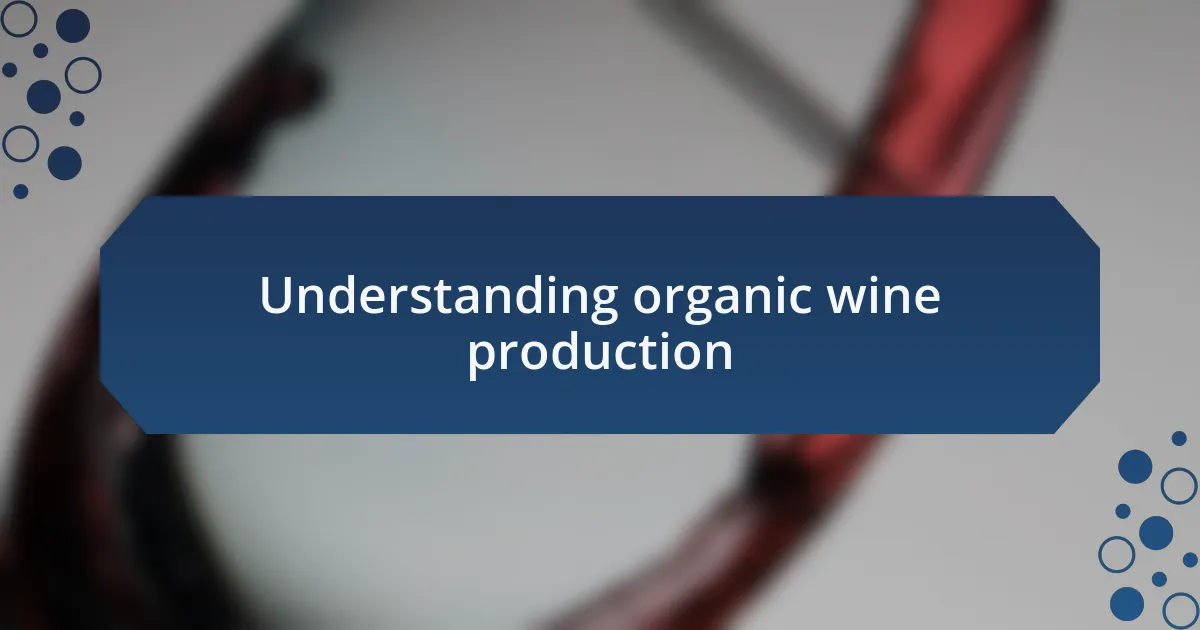
Understanding organic wine production
Organic wine production focuses on cultivating grapes without synthetic pesticides, fertilizers, or genetically modified organisms. When I first discovered organic wines, I was intrigued by the purity of the process. I had always thought of wine as simply a delightful beverage, but understanding that the grapes were treated with care deepened my appreciation for each sip.
In organic vineyards, practices like crop rotation and natural composting are used to enrich the soil and promote biodiversity. I remember visiting a small organic winery where the owner passionately explained how the health of the soil impacts the flavor of the wine. It made me wonder—how much of what we taste is influenced not just by the grapes but also by the very land they grow on?
Furthermore, organic producers often prioritize minimal intervention during fermentation, allowing the wine’s true character to shine through. This approach resonated with me personally; it felt like a celebration of nature’s process rather than an artificial manipulation. Have you ever tasted a wine and felt like you could sense the earth it came from? That’s the beauty of choosing organic.
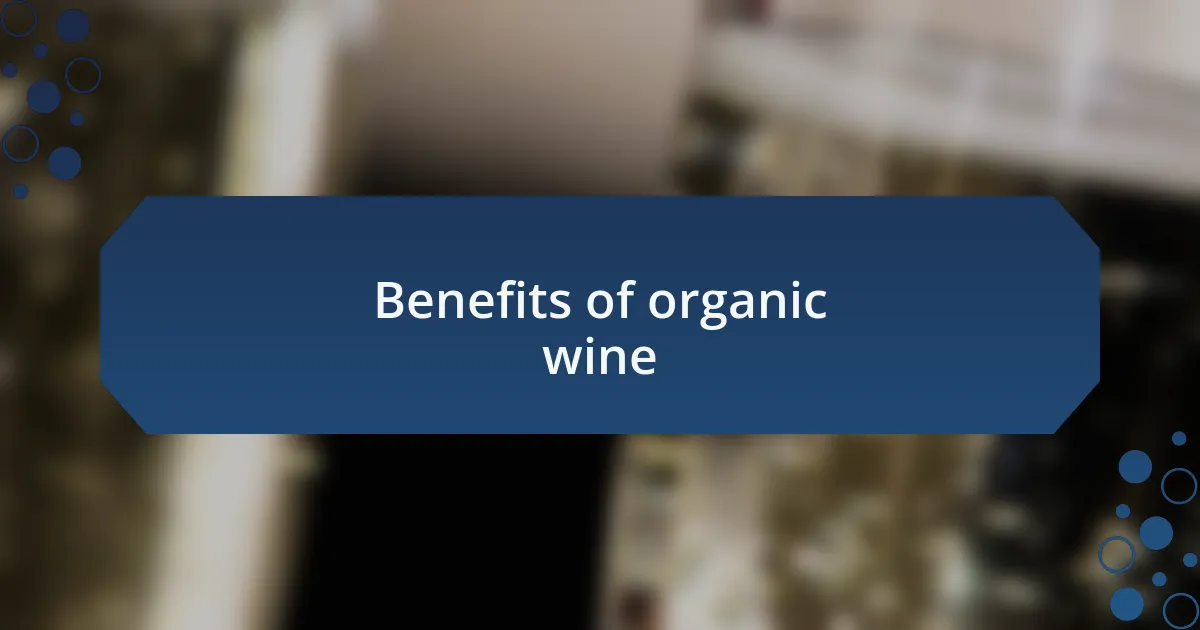
Benefits of organic wine
When I think about the benefits of organic wine, what immediately stands out is the environmental impact. Organic vineyards foster healthier ecosystems by promoting biodiversity, which I find incredibly important. Just the other day, I learned that organic farming can actually help restore local wildlife habitats. How many times have you enjoyed a glass of wine and thought about its journey? With organic wine, that journey also means a commitment to nurturing our planet.
Another fantastic aspect is the health benefits associated with organic wine. I remember reading about how organic wines often contain fewer sulfites and additives, making them easier on the body. This has personally enhanced my enjoyment of wine, allowing me to savor a glass without the usual worries about feeling bloated or having a headache the next day. Isn’t it refreshing to know that enjoying a glass of wine can also align with healthier choices?
Lastly, there’s an undeniable authenticity to organic wine. Each bottle has a story, reflective of both the land and the people who cultivate it. A visit to a vineyard last summer made this clear; the winemaker shared heartfelt tales about his family’s generations of care for the land. It struck me that with every sip of organic wine, I am connecting with that narrative. How amazing is it to drink something that embodies not just flavor but also passion and tradition?
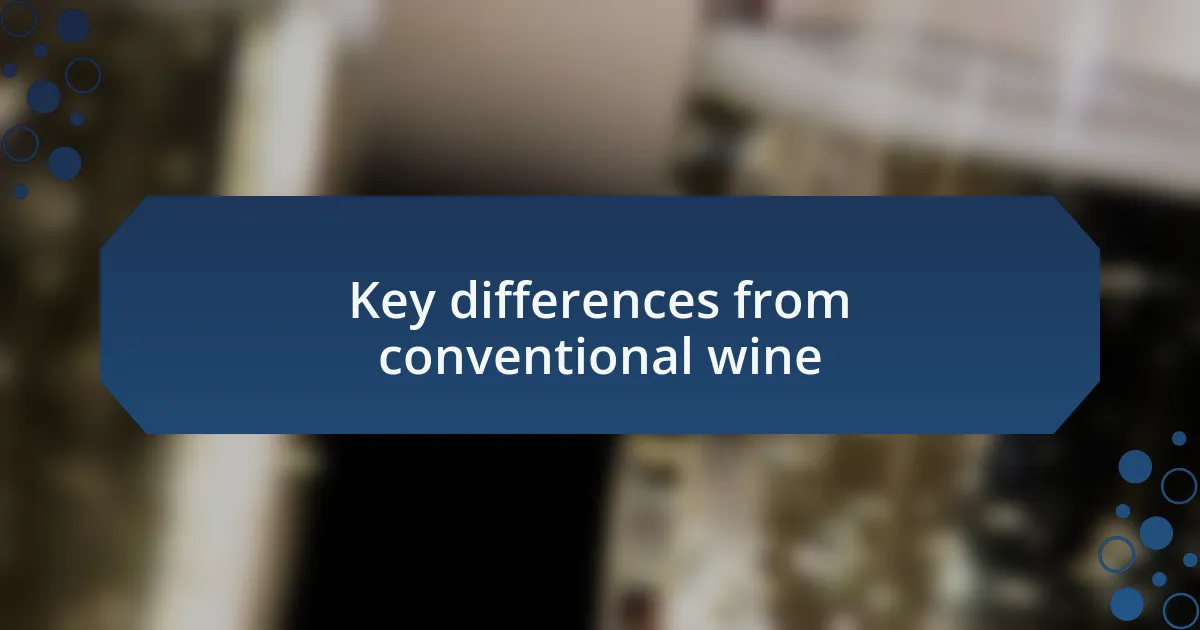
Key differences from conventional wine
When I compare organic wine to conventional wine, the reduction of chemical residues is striking. I remember tasting an organic red and being amazed by its purity; the flavors were so vibrant and true to the grape. Conventional wines, on the other hand, often contain a cocktail of synthetic pesticides and fertilizers, leaving me questioning what exactly I was consuming.
Another significant difference lies in the way the grapes are grown. Organic vineyards typically use natural methods to control pests and diseases, such as introducing beneficial insects or using crop rotation. I once visited a vineyard where the winemaker proudly showed me how they cultivate their grapes without artificial fertilizers. It was eye-opening to see the commitment to sustainable practices that nurture not only the vines but the entire ecosystem.
Moreover, organic wines often reflect specific terroirs, the unique characteristics of their growing environment. This became clear during a tasting event I attended, where each sip told a story of the land’s soil, climate, and community. Isn’t it fascinating how organic wine can connect us more deeply with its origin? Unlike the mass-produced conventional wines, organic options seem to carry a sense of place and purpose that adds to the overall experience.
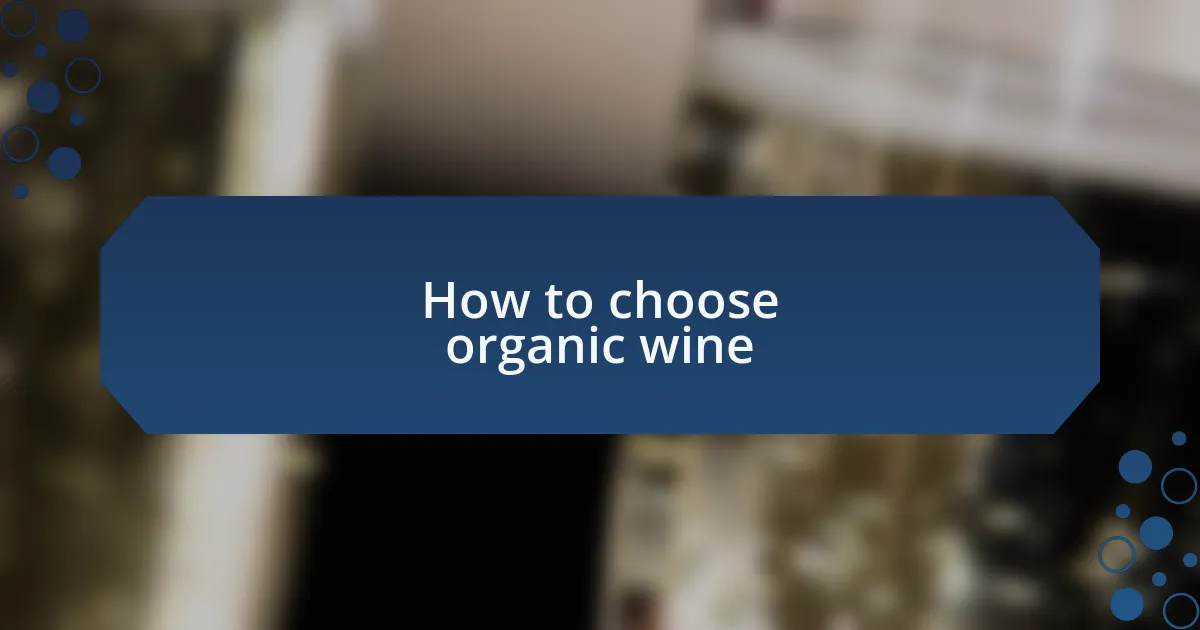
How to choose organic wine
Choosing organic wine can feel overwhelming at first, but it’s a journey worth embarking on. I remember standing in a wine shop, faced with rows of bottles, unsure which organic label to trust. My advice is to look for certifications like the USDA Organic seal, which ensures that the wine is produced without synthetic chemicals. It felt reassuring to know that I was making a more responsible choice just by reading the label.
Another aspect I like to consider is the grape variety; some varieties are better suited for organic farming than others. For instance, I’ve had fantastic experiences with organic Pinot Noir. The way its flavors lingered on my palate felt so much more genuine compared to conventional options. Have you ever noticed how certain wines evoke memories or moods? That’s a hint to how well they’re crafted.
Finally, don’t hesitate to explore local producers. I once visited a small organic winery where the owner was eager to share her passion for sustainable farming. Connecting with winemakers often leads to discovering unique blends and flavors that you won’t find in mass-market wines. It made me appreciate each glass even more, knowing the story behind it. Trust me, the experience of exploring organic wines can make each tasting feel like an exciting adventure on its own.
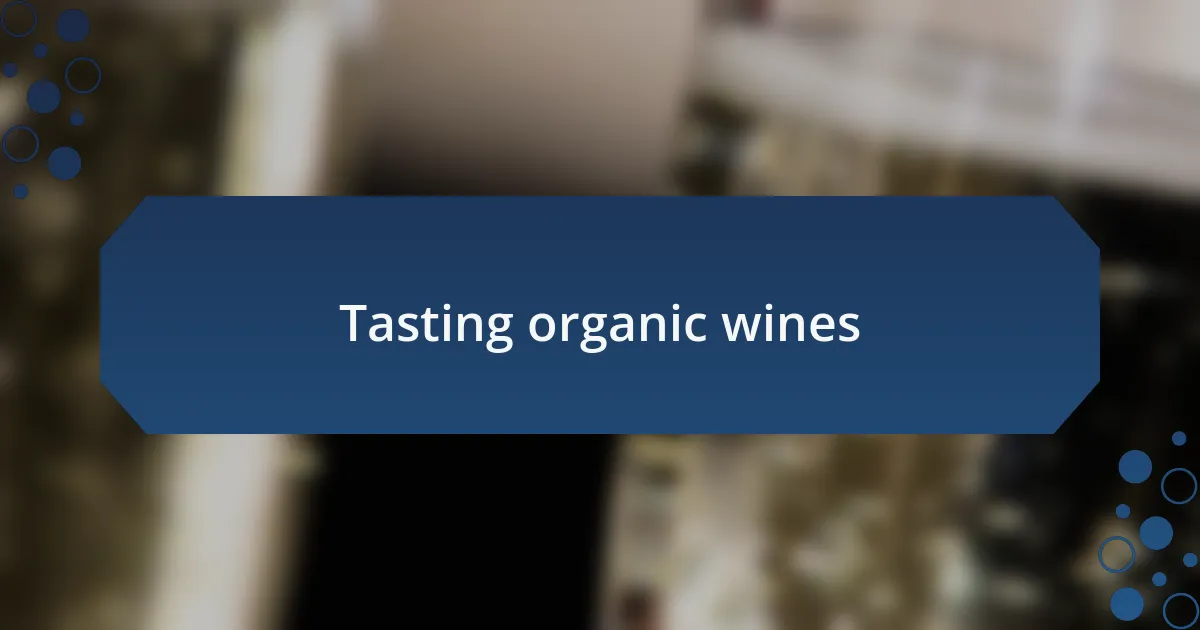
Tasting organic wines
Tasting organic wines can be a delightful experience, and I often find it fascinating how the flavors tell a story. Just the other weekend, I opened a bottle of organic Merlot from a small vineyard, and the moment I took that first sip, I was transported to the sun-drenched fields where the grapes were harvested. The richness of the wine reflected the care and attention given to its production, making every drop feel like a connection to the earth.
In my journey through organic wines, I’ve learned to appreciate the subtleties that set them apart. While at a friend’s gathering, we sampled an organic Sauvignon Blanc that burst with vibrant fruit notes. I couldn’t help but ask, have you ever tasted a wine that made you feel alive? This one did exactly that, sparking conversations about our favorite summer memories and pairing it perfectly with the fresh salad served.
One of the standout moments in my wine tasting adventures happened during a vineyard tour. The winemaker, a passionate individual deeply connected to his land, encouraged us to look, smell, and finally taste a newly released organic red. I remember swirling it in the glass, inhaling the complex aromas, and marveling at how this deliberate process added to my enjoyment. I realized that tasting organic wines isn’t just about flavor; it’s an experience grounded in respect for nature and tradition.

Pairing organic wine with food
When it comes to pairing organic wine with food, I love to think of it as a harmonious dance. Once, I enjoyed a delightful dinner featuring roasted chicken seasoned with herbs, and a lovely organic Chardonnay complemented the meal perfectly. It’s interesting how the crispness in the wine cut through the richness of the dish, adding an extra layer of enjoyment to each bite.
One of my favorite discoveries has been how well organic red wines can enhance a variety of cheeses. At a recent wine and cheese night, I experienced a classic combination of aged Gouda and an organic Cabernet Sauvignon. The wine’s bold tannins blended beautifully with the cheese’s creaminess, provoking the thought: doesn’t the right pairing elevate both elements? It truly felt like they were made for each other, transforming a simple gathering into an unforgettable feast.
I’ve also noticed how personal preferences play a role in pairings. Last winter, while I was enjoying a cozy evening with a hearty vegetable stew, I opted for an organic Pinot Noir. The wine’s light, fruity character complemented the earthiness of the stew, and I found myself savoring the moment. Have you ever found a pairing that surprised you? Those delightful revelations make the journey of exploring organic wine all the more rewarding.

My guilt-free wine enjoyment tips
One of my favorite tips for guilt-free wine enjoyment is to pay attention to portion sizes. I remember a summer evening spent on my patio, sipping a glass of organic Sauvignon Blanc. Instead of pouring myself a full glass, I opted for a half serving. This small change allowed me to relish the flavors without overindulging, and I appreciated each sip even more. Have you ever tried savoring a smaller portion? It really encourages mindfulness.
Pairing your wine with healthier snacks can also elevate your experience guilt-free. One memorable night, I prepared some fresh veggie sticks and hummus to accompany a crisp organic Prosecco. The refreshing bubbles danced on my palate while the snacks made me feel good about my choices. That balance made for a delightful evening that I genuinely enjoyed without any worry.
Lastly, I often explore unique wine styles that offer lower alcohol content but still deliver fantastic flavors. Recently, I stumbled across an organic low-alcohol red that surprised me with its vibrant notes. It reminded me that enjoying wine doesn’t have to mean sacrificing well-being. Have you considered experimenting with different wine styles? You might just find a new favorite that fits perfectly into your guilt-free lifestyle.